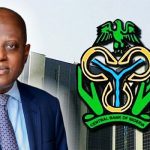Alleged Money Laundering: Court Dismisses Ajumogobia’s Application to Stop Trial
Featured, Latest Headlines, News Friday, June 28th, 2019
(AFRICAN EXAMINER) – A Federal High Court sitting in Lagos, Friday, dismissed a preliminary objection by the embattled Judge, Justice Rita Ofili-Ajumogobia, who is currently facing Money Laundering charge.
The court presided by Justice Rilwan Aikawa held that Ajumogobia is no longer a serving judicial officer and so, could face the criminal charge levelled against her by the Economic and Financial Crimes Commisdion (EFCC).
The anti-graft body charged Ofili-Ajumogobia and Mr Godwin Obla (SAN), on 18 counts bordering on Conspiracy, Unlawful Enrichment, retention of Crime Proceeds and Money Laundering.
They had pleaded not guilty to all counts of the charge and were granted bails in the sum of N10 million each with two sureties in like sum.
The defendants were first charged before an Ikeja division of the High Court which had struck out the charge on jurisdictional grounds.
Consequently, the EFCC preferred same charges against the defendants, before the Federal High Court.
At the last adjourned date – May 18, first defence counsel Chief Robert Clarke (SAN) had informed the court of a preliminary objection challenging the jurisdiction of the court.
He had argued that the first defendant was still a serving Judge of the court as there was no gazetted instrument tendered by prosecution to show her dismissal by the President.
In the same vein, second defence counsel, Chief Ferdinard Orbih (SAN) had also drawn the court”s attention to pending motions before the court seeking to separate the charges in favour of second defendant.
The court had then adjourned for ruling.
In his ruling Friday, Justice Aikawa read out a memo dated November 7, 2018, signed by the President, approving the dismissal of the first defemdant from the Bench as recommended by the National Judicial Council (NJC).
”The President has approved the recommendation of NJC and has therefore approved the dismissal of the first defendant/applicant.
“In my view, the first defendant has been dismissed as a judicial officer; In the light of this, she can stand trial as she is no longer a judicial officer.
“The application lacks merit and is accordingly dismissed” the judge held.
Earlier in the ruling, the judge disagreed with the argument of the first defence counsel that the exhibit marked ‘Restricted’ was a private document.
He held that the document exhibit EFCC 02, though marked ‘Restricted’ but bearing the coat of arm of the Federal Republic of Nigeria, qualified as a public document.
In the same vein, the application filed by the second defendant Godwin Obla (SAN) was also dismissed.
Obla had sought an order to quash counts one, two and three of the charge for abuse of court process or in the alternative separate his trial from the charge against the first defendant and be tried separately.
The judge in conclusion held that the trial of the two defendants would go together.
“I therefore refuse the second application,” he said.
After the ruling, the Prosecution Counsel, Mr Rotimi Oyedepo made an oral application for accelarated hearing of the matter.
He prayed the court to fix a date for commencement of the trial.
Justice Aikawa then adjourned the matter until October 24 and 25 for start of the trial.
EFCC alleged that the defendants conspired on May 21, 2014, to indirectly conceal different sums of money, in the Diamond Bank account of Nigel & Colive Ltd, a company alleged to be operated by Ajumogobia.
They were alleged to have conspired to retain in same account, the sum of N500 million, which they both reasonably ought to have known formed part of proceeds of unlawful acts of unlawful enrichment.
Ajumogobia was alleged to have on different dates in 2014, retained sums of monies like: N5million, 150,000 dollars, 20,000 dollars, 30,000 dollars, 50,000 dollars, and 55,000 dollars in the Diamond bank account of Nigel and Colive.
The EFCC also accused Ajumogobia of indirectly concealing the sum of N12million in the same account, and making false statement to the EFCC that the money was payment for sale of a landed property.
The alleged offences contravenes the provisions of Sections 15 (2) (a) and 18 (a) of the Money Laundering Prohibition Act, 2011./NAN
Related Posts
Short URL: https://www.africanexaminer.com/?p=48796






















